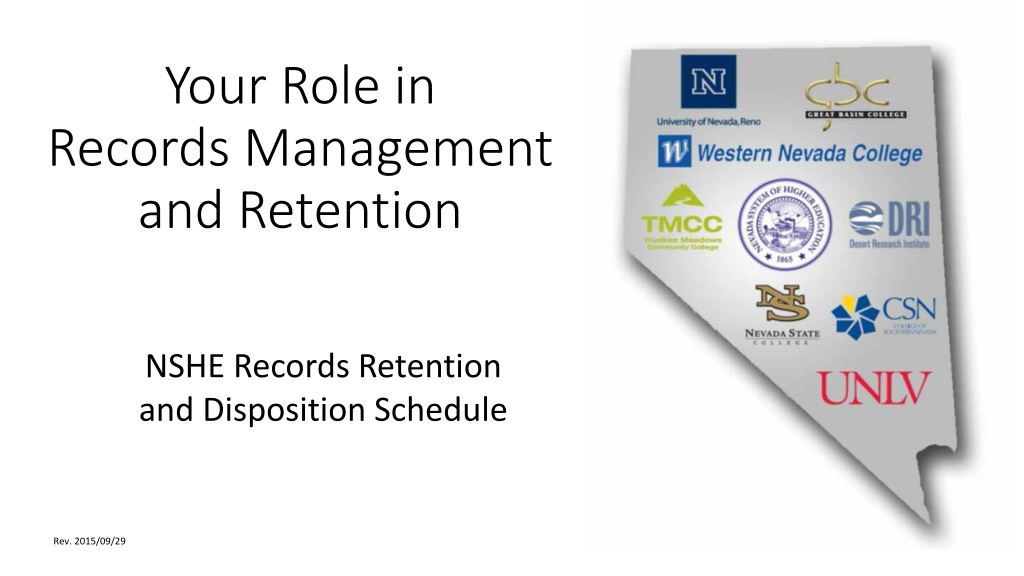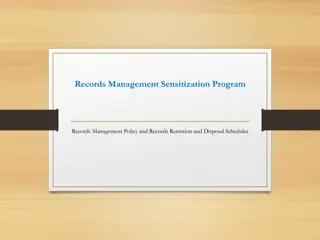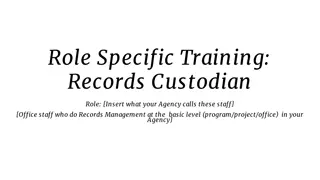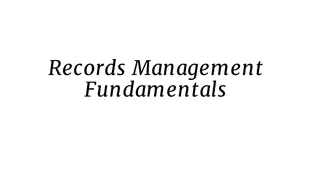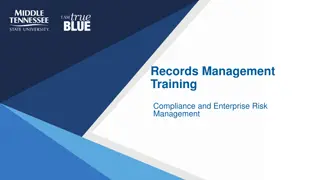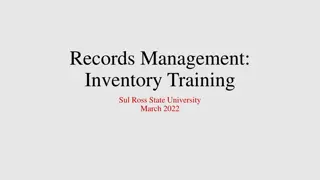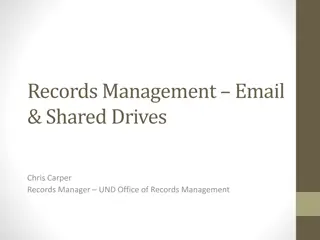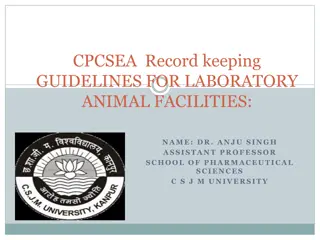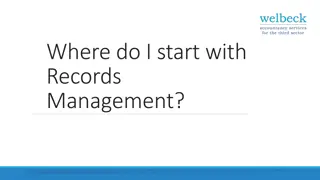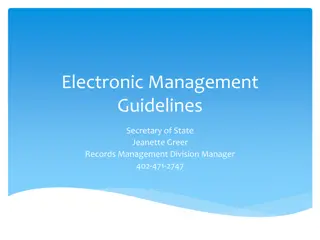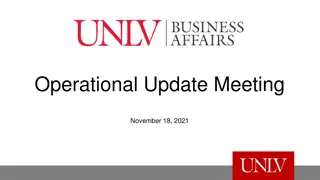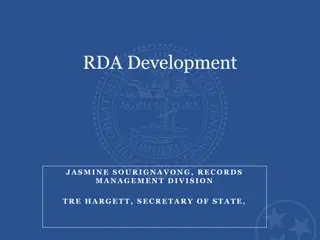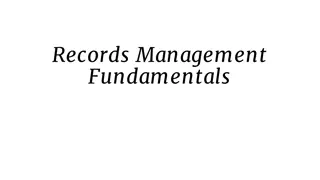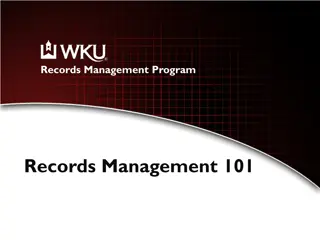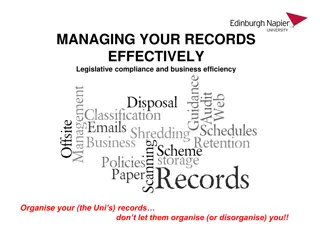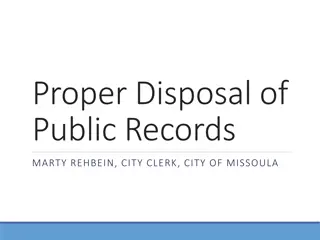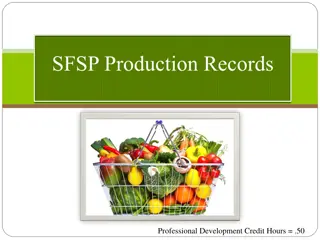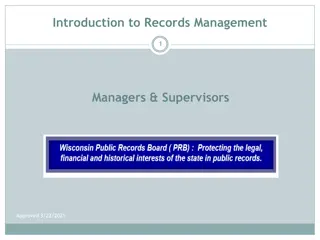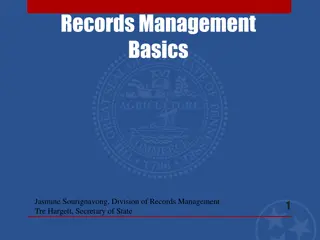Understanding Records Management and Retention in NSHE
Explore the importance of records management and retention in NSHE institutions, including definitions, responsibilities, and reasons why it's necessary. Learn about record maintenance, disposal, compliance, transparency, efficiency, and more.
Download Presentation

Please find below an Image/Link to download the presentation.
The content on the website is provided AS IS for your information and personal use only. It may not be sold, licensed, or shared on other websites without obtaining consent from the author. Download presentation by click this link. If you encounter any issues during the download, it is possible that the publisher has removed the file from their server.
E N D
Presentation Transcript
Your Role in Records Management and Retention NSHE Records Retention and Disposition Schedule Rev. 2015/09/29
Road Map Records Management Definitions Retention Schedules Explained Disposition and Disposition Holds Helpful Tips and Resources
Records Management: What is it? The process by which records are maintained in a manner which is secure, cost effective, and allows for the rapid retrieval and protection of the information contained within the record. It includes refraining from accumulating unnecessary records which are not essential to the proper functioning of the institution or unit.
Records Management: Why is it Necessary? Ensures federal, state, and regulatory compliance; Facilitates transparency; Creates consistency across institutions and departments; Safeguards valuable information; Assists in preserving the history and heritage of institutions; Maintains business continuity; Supports decision making; Reduces potential exposure of confidential information; Improves efficiency, productivity, and rapid retrieval of information; Because space is at a premium.
Records Management: Whos Responsible for it? Responsibility for the proper maintenance and disposition of records lies in the hands of the institution, unit, or individual to which the records belong. All members of the NSHE community have an important role to play by creating, using, retrieving, and disposing of records in accordance with the NSHE policy. Further, all members of the NSHE community should be familiar with the policy and know how to access and implement the records retention schedule (including any approved special schedule(s)).
Definitions: What is a Record? Any form of recorded information, regardless of physical characteristics, that is [i] created, [ii] received, [iii] recorded, [iv] maintained, or [v] legally filed in the course of the institution or unit s [a] business activities or [b] fulfillment of its legal obligations.
Definitions: What is a Record? Records serve as evidence of the institution or unit s organization, functions, policies, decisions, procedures, operations, transactions or other activities. The term does not include nonrecords .
Definitions: What is a Nonrecord? Nonrecords include, without limitation: Published books and pamphlets, including published materials printed by a governmental printer; Informal notes and convenience copies, Drafts or documents that are clearly pre-decisional or deliberative; Ad hoc reports and reference materials not relating to a specific project;
Definitions: What is a Nonrecord? Nonrecords include, without limitation (cont.): Stationary and unused blank forms except ballots; Brochures, newsletters, magazines, catalogs, and price lists; Databases and backup files; Any other documentation that does not serve as the record of an official action of a state agency; and
Definitions: What is a Nonrecord? Nonrecords include, without limitation (cont.): Work papers used to collect or compile data, or drafts developed from those work papers, unless: An appraisal conducted by the institution/unit or state archivist indicates that the work papers or drafts have [i] legal, [ii] fiscal, or [iii] research or archival value.
Definitions: What is a Transient Record? Transient records can be in any medium (electronic, paper, etc.), and include documents which serve to convey information of a temporary or very short-lived administrative, legal, and/or fiscal value.
Definitions: What About Emails and Other Electronically Stored Information? Email and other electronically stored information, excluding a database, is a format, not a record type. Just as with physical records, the content, not the form, of the information determines its retention and disposition. If the electronic information meets the criteria of a record, it must be managed in accordance with the NSHE policy.
Definitions Review: Is it a Record? A draft financial report is a record. False A promotion and tenure application received by a Tenure Review Committee is a record. True Whether a database is a record depends upon the content of the database. False A personal copy of The Board of Regents Handbook is a record. False Emails between University researchers discussing the results of joint testing are never records. False
Retention Schedules Explained Schedule Types: General and Special General Records Retention Schedule (Schedule) is a comprehensive list of records created in the course of NSHE business activities, indicating for each record type the official repository, length of time the records are to be maintained, and their disposition. Each NSHE institution and unit must manage its records in accordance with the Schedule.
Retention Schedules Explained Schedule Types: General and Special Special Records Retention Schedules (Special Schedule) may be developed, if approved by the Chancellor after review by the state records committee, to address records unique to limited aspects of an institution or unit s operation.
Schedules Explained: Column 1 Type of Record Provides short description of the various types of records, which are grouped by record category (e.g., human resources, accounting & financial, etc.).
Schedules Explained: Column 2 Official Repository Identifies the Official Repository for each record, which is the unit, department, or division designated as having responsibility for retention and timely destruction of that particular type of record.
Schedules Explained: Column 3 Retention Period Sets forth the record retention period, which can be set period of time (e.g., FY + 4 years ), an event- driven period (e.g., until superseded ), or Permanent.
Schedules Explained: Column 4 Disposition Sets forth the proper disposition of the record following the expiration of the retention period, which can be Regular , Secure , Archival Review , Archives , On Site , or Other .
Retention Schedules: Tips & Reminders Retention periods are not suggestions: The Schedule identifies the minimum time period the listed records must be retained, meaning records disposition must not occur before this retention time period expires. All NSHE employees should implement regular, routine disposition procedures and should not selectively retain some records longer than prescribed retention period absent a specific business need.
Retention Schedules: Tips & Reminders If a specific record is not covered in the Schedule, or where revisions may otherwise be needed, please contact your institution or unit Records Retention Officer to discuss the issue. In such circumstances, do not destroy the record until you have received clear guidance from the Records Retention Officer.
Retention Schedules: Review No. Dean Sanchez's copy does not constitute a record Disgusted with the whole experience, Dean Sanchez shredded his copy of Sally s application a month after her termination. Any concerns? At the end of the retention period Joe in H.R. placed Sally s application materials in the recycle bin. Any concerns? Yes. Placing the materials into a recycle bin is not Secure When does the retention period with respect to the application materials Sally submitted to H.R. expire? 06/30/2024 If the falsification had been discovered earlier in the process and Sally had not been hired, what is the earliest H.R. could properly dispose of Sally s application materials? 06/30/2017
Disposition and Disposition Holds Generally, disposition should occur as follows: Official records: Once retention period has been satisfied. Nonrecords and transient records: When no longer needed. Nonrecords and transient records should NEVER be kept longer than the official record. Certain events, called "Disposition Holds , may occur that will require the immediate stoppage or delay of regular disposition practices of records, nonrecords, and transient records.
Disposition and Disposition Holds Audits When an audit of your area or function is begun, all destruction of records in your custody must cease. During the audit, records should be made available to the auditors subject to confidentiality laws. Upon the completion and resolution of the audit, you may begin to dispose of records in accordance with the Schedule.
Disposition and Disposition Holds Investigations When you are notified of an investigation involving your area or function, all relevant records, nonrecords, and transient records must be preserved until the investigation is completed. You should consult with your legal counsel for specific advice.
Disposition and Disposition Holds Litigation/Legal Holds When you receive notification of or reasonably anticipate litigation, you must (1) suspend the destruction or other disposition of all records, nonrecords, and transient records reasonably related to the subject matter of the litigation, (2) put in place a litigation hold to ensure the preservation of documents, and (3) consult with System or General Counsel.
Disposition and Disposition Holds Litigation/Legal Holds (cont.) All destruction of records, nonrecords, and transient records pertaining to the litigation hold must be stopped until the matter has been resolved. You will be notified by your System or General Counsel when the matter is resolved and advised regarding the proper disposition of the records. All questions regarding Disposition Holds must be directed to System or institution General Counsel.
Helpful Tips and Resources Know the retention schedules (general and specific) for your records. Have a consistent and orderly recordkeeping system, including with respect to emails. Have written procedures for handling your records. Timely dispose of records upon expiration of the required retention period.
Helpful Tips and Resources Dispose of the records correctly. Employees should contact their supervisor with any questions regarding records retention and/or the Schedule. The supervisor should contact the Records Retention Officer for assistance as needed. NSHE Records Retention and Disposition Schedule NSHE Records Retention Schedule FAQs
